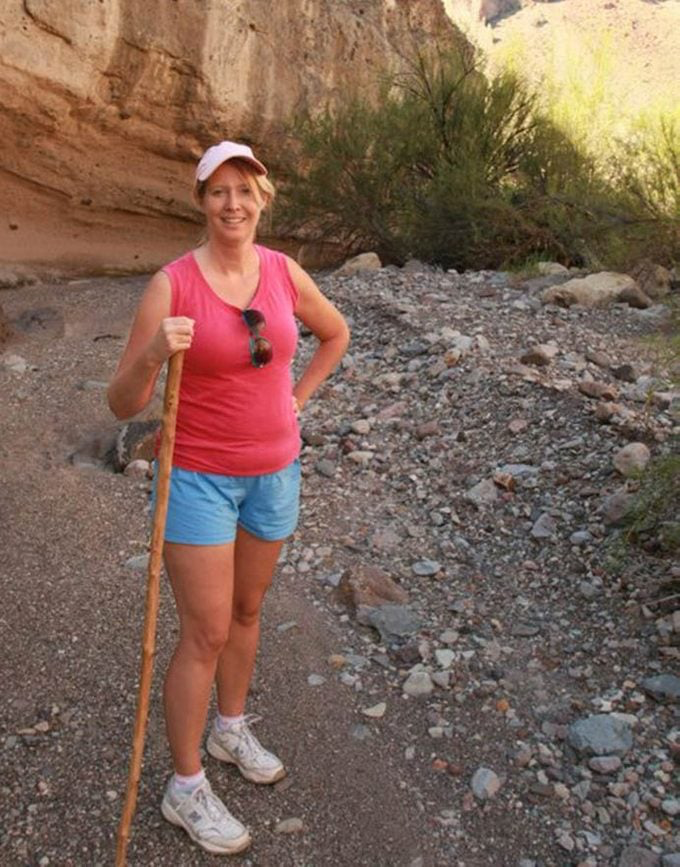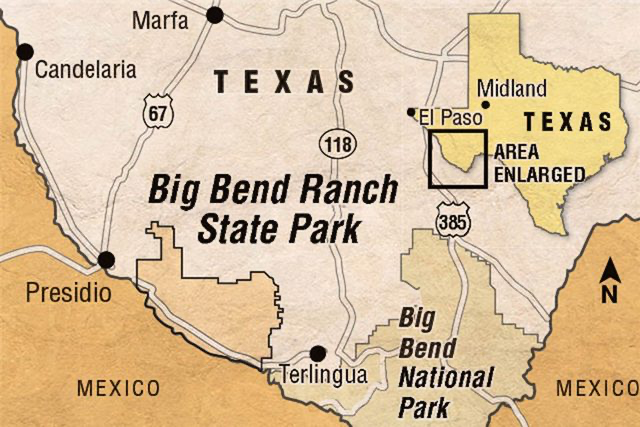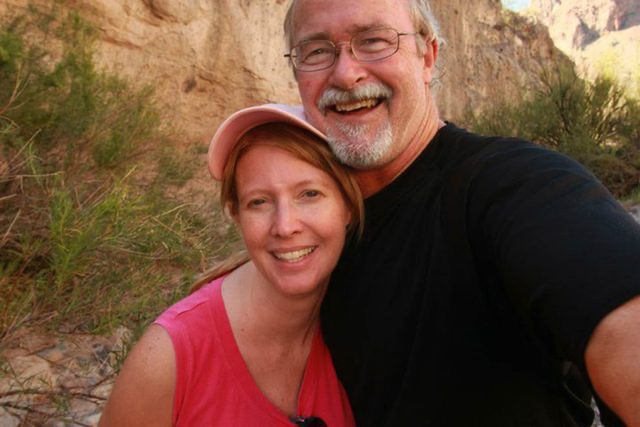The author had eagerly anticipated a day of hiking with her husband in a beautiful Texas state park, but just four days later, she found herself hungry, severely dehydrated, and all alone.
Her fascination with the Chihuahuan Desert in western Texas began back in 1996, during her time as a reporter for the Odessa American. Her beat included the Big Bend area—named for a dramatic curve in the Rio Grande.
She was captivated by its silence, the stark clarity of the night sky, and the surprising vibrancy of tiny flowers dotting the desert landscape. Her husband, Rick McFarland, a photographer, was equally drawn to the region. In 2001, they were married on a trail in Big Bend National Park.
Fast forward twelve years, and they returned for another hiking adventure, this time on the Fresno West Rim trails in nearby Big Bend Ranch State

Park, often called “The Other Side of Nowhere.” Their plan was to complete a five-mile hike to the West Rim Overlook, which promised stunning views of the Solitario flatirons—steeply slanted, V-shaped rock formations. The trail was designed to loop back to the Puerta Chilicote Trailhead, making for a full day’s hike. They set off with excitement, eager to immerse themselves once again in the desert’s solitude and beauty.
DAY 1: Wednesday, October 2
They arrived at the parking area around 10:15 a.m., a mile from the trailhead. The temperature was already 73 degrees, with a high expected to reach 91. Equipped with two canteens and eight bottles of water, they also carried granola bars and bananas in the author’s fanny pack. The desert was buzzing with life—bees darted around yellow flowers, and vibrant pink blooms dotted the ground. She thought to herself, this might become my new favorite trail.
As they descended into Fresno Canyon, the terrain grew steep and rocky, forcing her to rely on her wooden hiking stick for balance. She stumbled and slid along the way, frustration building with each misstep.
At the bottom of the canyon, they followed a jeep trail that ran alongside the dry bed of Fresno Creek. Eventually, they reached a junction where another creek bed crossed their path. Unsure whether to continue along the Fresno creek bed or take the right fork, they ventured right. With no signs or cairns (stone piles used for trail markers) to guide them toward the ranch, Rick suggested, “Let’s try the other way.”
After retracing their steps, they finally made it to the ranch. Exhausted and thirsty, they found shade beside a parked Jeep, having already downed three bottles of water each. Grateful for the rest, they took long drinks from their canteens.
“I think we should wait for the people who own this Jeep and ask for a ride,” she suggested, concerned. “I’m not sure I can handle the climb back, especially with our water running low.”
By 1:30 p.m., the day had reached its peak temperature, and the climb back up the canyon would be even more grueling than the descent. With the sun beating down, Rick checked the map. “We’re almost halfway through the loop,” he said. “We might as well keep going.”
Throughout the afternoon, the relentless heat sapped our energy. We had to stop frequently, lying on our backs, shaking our canteens for any last drops of water, and licking the insides of empty bottles. The trail markers, or cairns, seemed to disappear into the desert brush, leaving us confused and off-course. Exhausted, we spent precious time backtracking, and when the path seemed lost, we had no choice but to bushwhack our way through cacti.

Suddenly, we came to a dead end at the edge of a canyon. “Oh my God,” I gasped. It was already 8 p.m., and we had hiked nearly eight and a half miles, making little progress.
“Help!” Rick shouted suddenly, startling me.
We both yelled into the canyon, “Help! We’re lost! We need water!” but the only response was the echo of our voices bouncing off the canyon walls.
Rick checked his phone for a signal but found none. It did, however, offer us light to scan the overlook. He was growing more concerned about potential wildlife—mountain lions, snakes, and coyotes. He picked a rocky spot where we could bed down for the night. “It’s going to get cold,” he warned. Wearing only shorts and light shirts, we curled up together for warmth. I shut my eyes, desperate for sleep.
DAY 2: HOPE
At dawn, it had been 13 hours since our last sip of water. We hiked 500 yards back to the last cairn we had spotted, which led to the Mexicano Falls Overlook. “That’s where we went wrong,” Rick realized. “We followed markers to the overlook instead of the main trail.” According to the map, we still had five miles to go to reach the trailhead where our pickup truck waited.
With renewed hope, we set off, but optimism quickly faded as we lost the trail markers again. We repeatedly crisscrossed our path, searching for hidden cairns. The unforgiving terrain, filled with arroyos, forced us to scramble up steep inclines, only to slide down into another exhausting climb.
“When is this going to end?” I cried out in frustration.
“Never,” Rick muttered, forcing his way through yet another thorny bush.
We thought of our children, Amanda, ten, and Ethan, eight, who were with my parents in North Little Rock. The thought of them worrying about us gave us strength, but after four more hours in the blistering 91-degree heat, I needed a break. I had read about a woman who survived the desert heat by resting during the day and moving at night, so I found shade under a rock formation. As I cooled off, I noticed a bright green prickly pear cactus. I knew that cactus juice was sometimes used in drinks, so I cut into two pads with Rick’s knife, sucking out the liquid and pulp. Needles embedded in my mouth, but the small amount of moisture was worth it.
“That’s disgusting,” Rick spat out the pulp.
“Don’t spit! We need all the water we can get.”
In the shade of the rocks, I pinched my skin and saw that it didn’t bounce back—a clear sign of severe dehydration. My lips were cracked, and my tongue felt swollen and useless.
“I’m scared we won’t make it,” I confessed, hoping Rick would reassure me.
“I’m scared too,” he admitted quietly.
As the sun began to set, Rick stood up. “We have to keep moving.”
Suddenly, as we staggered along the trail, Rick spotted something below us—cottonwood trees, a sign of water in the desert. He bolted toward them.
“Water!” Rick shouted, disappearing into the cottonwoods. I followed and found him kneeling at a small spring. He filled my canteen, and I drank deeply as night fell. Though the desert would be cold again, the water gave us hope.
DAY 3: SEPARATION
The next morning, after refilling our canteens at the spring, Rick was determined to find the trail. We had been saved by the water, but it wasn’t enough. No one knew we were lost, and we were still far from safety.
Climbing out of the canyon, we found the trail briefly, only to lose it once more. “Enough!” Rick shouted in frustration. “I know the way. My truck is that way—we’re done with the markers.”
Driven by his gut instinct, we left the trail entirely. Rick was sure we were near the original path we had taken, and eventually, we crossed it without recognizing it. Still, Rick watched the time closely, knowing we needed to reach the trailhead by 2 p.m. to avoid the full heat of the sun.
At 12:30 p.m., I saw a small tree and collapsed beneath its shade. “I can’t go any further,” I admitted, feeling like I was holding him back.
Rick hesitated, torn between staying with me and going ahead to find help. “I’ll wait for you,” I promised. “I can hang on.”
Reluctantly, Rick gave me the last of his water and left. Alone, I savored the final drops.
Hours passed, and as night fell, Rick faced his own struggles. Deprived of food and water, his hope began to fade. But thoughts of me waiting for him kept him going. He knew if he stopped, so would I.
Then, something glimmered in the distance, catching Rick’s eye—a truck parked near the trailhead. This meant our SUV was just a mile away.
An hour and a half later, Rick pulled up to the park headquarters, honking and shouting in a panic. His frantic arrival caught the attention of assistant park superintendent David Dotter.
“My wife and I were lost in the desert,” Rick cried out. “She’s still out there.”
Dotter quickly drove Rick to the trailhead. Rick, too weak to continue, stayed behind as the ranger began his search for me. But after nearly two hours, Dotter returned alone, unable to find me. He immediately contacted the Texas Department of Public Safety for more help.
The sound of a helicopter overhead pulled me from a restless sleep. Its spotlight swept through the darkness, filling me with a surge of hope.
“Rick!” I screamed. Then, unexpectedly, I cried out, “Mommy! Daddy! Please, help me!”
The helicopter’s light moved methodically across the horizon. Too weak to stand, I used my hands and feet to scramble up a small incline. “I’m here!” I shouted. “I’m here!”
But it was no use. The spotlight never reached the deep ravine where I lay.
DAY 4: ALONE
When my wedding ring slipped from my shriveled finger, I weakly searched the ground for it. The desert had taken so much from me; now it had claimed my ring as well. As the heat intensified, my hallucinations worsened. In one, I imagined babysitting a neighbor’s child, who, in reality, was a reflection of myself—struggling with limbs that no longer responded.
My body continued to deteriorate. Fluids drained from me as my organs—kidneys, heart, liver, and lungs—began to fail under the strain of the heat and dehydration. Bit by bit, my body was shutting down.
Meanwhile, Rick, now rested, joined two dozen searchers on the trail. He pushed through thickets while park superintendent Barrett Durst tried to keep up. “Wait! Wait!” Durst called after him.
But Rick pressed forward, his resolve unshaken. “I’m going to find her. I’m going to bring her back.”
The rescuers spent the day retracing the route where we had parted. Rick desperately searched for familiar landmarks, especially the boulders near the mesquite tree where he had last seen me. But nothing looked familiar. He grew increasingly frustrated. Where is she? Why can’t I remember?
DAY 5: THE FINAL DAY
By 6 a.m. on Sunday, nearly 40 searchers had joined the effort. Most feared they were no longer looking for a rescue, but for a body. To spare Rick from potentially finding my remains, Dotter convinced him to stay at headquarters while the teams continued the search.
As the search carried on, volunteers Shawn Hohnstreiter and Andy Anthony called out my name, hoping for any response. Meanwhile, state park police officer Fernie Rincon and game warden Isaac Ruiz descended into a deep valley. They could hear Hohnstreiter’s team faintly in the distance, calling, “Cathy, can you hear us?”
“Help!” I whispered, my voice barely audible.
Rincon turned to Ruiz.
“Help me,” I cried again, louder this time.
Rincon and Ruiz rushed toward the sound of my voice, scrambling to the edge of the ravine. “We’ve found her!” Rincon shouted as they made their way down. “She’s alive!”
When they reached me, I was shaking and delirious, mumbling about marrying Rick at Big Bend National Park 12 years earlier. Rincon gently interrupted, “Do you know your name?”
His voice broke through the fog in my mind. “Cathy,” I croaked. “Is my husband okay?”
“He’s the reason we’re here,” Rincon replied.
At the University Medical Center of El Paso, doctors told me I had been just hours away from death. I was in acute renal failure, and my heart, lungs, and liver had sustained damage. They diagnosed me with rhabdomyolysis, a condition where muscle fibers break down, releasing toxins into the bloodstream. My body temperature fluctuated uncontrollably, and cactus spines were embedded all over me.
Despite everything, I felt an overwhelming sense of relief when Rick arrived at the hospital. He was truly okay. We spoke about the children, the search, and our ordeal. Before he left, a nurse asked Rick if he wanted to take any of my belongings. “Maybe her wedding ring,” he suggested, noticing my reaction.
“I lost it,” I admitted. “It fell off my finger, and I couldn’t find it.”
Rick held my hands tightly, just as he had when he left me in the desert. The desert might have taken my ring, but it hadn’t taken us.
